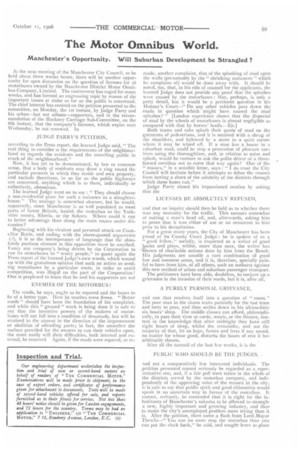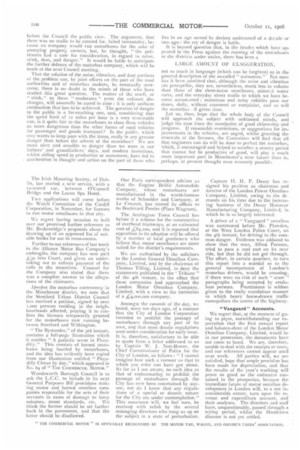The Motor Omnibus World.
Page 7

Page 8

If you've noticed an error in this article please click here to report it so we can fix it.
Manchester's Opportunity. Will Suburban Development be Strangled ?
At the next meeting of the Manchester City Council, to be held about three weeks hence, there will be another opportunity for open discussion on the question of licenses for 16 motorbuses owned by the Manchester District Motor Omnibus Company, Limited. The controversy has raged for many weeks, and has formed an engrossing topic by reason of the important issues at stake so far as the public is concerned. The chief interest has centred on the petition presented to the committee, on Monday, the ist instant, by Judge Parry and his urban—but not urbane—supporters, and in the recommendation of the Hackney Carriage Sub-Committee, on the 8th instant, that the company's licenses, which expire next Wednesday, be not renewed. In JUDGE PARRY'S PETITION, according to the Press report, the learned Judge said, " The real thing to consider is the requirements of the neighbourhood as regards the residents and the travelling public in reach of the neighbourhood." Now, it has yet to be demonstrated, by law or common sense, that a body of residents may draw a ring round the particular preserve in which they reside and own property, and exclude therefrom, in so far as the public highways are concerned, anything which is to them, individually or collectively, obnoxious.
'The learned Judge went on to say : "They should choose a non-residential place for such a nuisance as a slaughter, house." The analogy is somewhat obscure, but he would, Apparently, since Manchester is as well populated as most parts of Great Britain, banish the motorbus to the Yorkshire moors, Siberia, or the Sahara. Where could it run to better advantage than along the main routes under discussion?
Beginning with his virulent and personal attack on Councillor Boyle, and ending with the above-quoted arguments ( ?), it is to the intemperance of language that the absolutely partisan element in this opposition must be ascribed. ancy any company's being driven by the Corporation to run its motorbuses to "worry people," to quote again the Press report of the learned Judge's own words, which wound up with the gratuitous opinion that such an action as sending motorbuses by a particular route, in order to avoid competition, was illegal on the part of the Corporation ! One is perplexed to learn that he and his supporters are not
ENEMIES OF THE MOTORBUS !
The roads, he says, ought to be repaved and the buses to :be of a better type. here he touches terra firma. " Better roads " should have been the foundation of his complaint, and while this "ground " work is being done it is safe to say that the inventive powers of the makers of motorbuses will not fall into a condition of desuetude, but will be strained to the utmost in the direction of the improvement or abolition of offending parts; in fact, the smoother the surface provided for the owners to run their vehicles upon, the more easily will their difficulties, both internal and external, be removed. Again, if the roads were repaved, or re made, another complaint, that of the splashing of mud upon the wails (presumably by the " shrieking nuisances " which he complains of) would be done away with. It should be noted, toe', that, in his role of counsel for the .applicants, the learned Judge does not provide any proof that the splashes were caused by the motorbuses that, perhaps, is only a petty detail, but it would be a pertinent question in his Honour's Court--" Do any other vehicles pass down the roads in question whichmight have caused the mud splashes? " [London experience shows that the dispersal of mud by the wheels of motorbuses is almost negligible as compared with that by horses' hoofs.—ED.] Both trams and tabs splash their quota of mud on the garments of pedestrians, and it is received with a shrug of the shoulders, and followed by a move to a quiet corner where it may be wiped off. If a man has a house in a Fuburban road, could he stop a procession of pleasure cars from using the thoroughfare, and, in relation to noise and splash, would he venture to ask the polite driver of a threehorsed omnibus not to come that way again? * One of the " masses," in a sensible letter, says : " 1 do trust the City Council will hesitate before it attempts to debar the masses from having a share of the salubrity of the districts through which these buses run."
Judge Parry closed his impassioned oration by asking that the LICENSES BE ABSOLUTELY REFUSED, and that an inquiry should then be held as to whether there was any necessity for the traffic. This savours somewhat ot cutting a man's head off, and, afterwards, asking him to prove that it was either of use or an ornament to him prior to his decapitation.
For a great many years, the City of Manchester has been proud of its County Court Judge : he is spoken of as a " good fellow," socially, is respected as a writer of good books and plays, whilst, more than once, the writer has -known of Charitable actions done by him from the Bench. Ilis judgments are usually a rare combination Of good law and common sense, and it is, therefore, specially painful to have from him, of all others, such an outburst against this new method of urban and suburban passenger transport.
The petitioners have been able, doubtless, to conjure up a grievance in the invasion of their roads, but it is, after all, A PURELY PERSONAL GRIEVANCE, and one that resolves itself into a question of " zones." The poor man in the slums waits patiently for the last tram and lorry to pass, and then settles down to his all-too-little' six hours' sleep. The middle classes can afford, philosophically, to pass their time at cards, music, or the fheatre, content in the knowledgethat after midnight they have still eight hours of sleep, whilst the remainder, and not the majority of that, let us hope, fumes and frets if any sound, no matter for whose good, disturbs the hours of rest it has arbitrarily chosen.
After all the turmoil of the last few weeks, it is the
PUBLIC WHO SHOULD BE niE JUDGES, .
and not a comparatively few interested individuals. The ,petition presented cannot seriously he regarded as a representative one, and, if a fair poll were taken in the whole of the districts served by the motorbus company, and independently of the approving voice of the masses in the city, it is safe to say that public spirit and good citizenship would speak in no uncertain way in favour of the motorbus. It cannot, seriously, be contended that it is right for the inhabitants of Manchester's suburbs to be allowed to strangle a new, highly important and growing industry, and thus to make the city's unemployed problem more trying than it is. After the petition, there came .a flash from Lord Mayor Thewlis—" You can no more stop the motorbus than you can put the clock back," he said, and sought -leave to place before the Council the public view. The argument, that there was no traffic to be catered for, failed lamentably, because 110 company would run motorbuses for the sake of annoying property owners, but, he thought, " the petitioners had a case for consideration, in regard to noise, stink, dust, and danger." It would be futile to anticipate the further defence of the motorbus company, which will be made at the next Council meeting.
That the solution of the noise, vibration, and dust portions of the problem can, by joint efforts on the part of the road authorities and of motorbus makers, be eventually overcome, there is no doubt in the minds of those who have studied this great question. The matter of the smell, or " stink," as these " moderates " term the exhaust discharges, will assuredly be cured in time : it is only uniform combustion that has to be achieved. The question of danger to the public is a far-reaching one, and, considering that the speed limit of 12 miles per hour is a very reasonable one, is it quite fair to the motorbuses to class these vehicles as more dangerous than the other forms of road vehicles for passenger and goods transport? Is the public, which ever wants to keep pace with the times, really in any greater danger than before the advent of the motorbus? We are more alert and sensible to danger than we were in our fathers' and grandfathers days, and modern inventions, whilst aiding speed in production or movement, have led to acceleration in thought and action on the part of those who live in an age served by devices undreamed of a decade or two ago : the cry of danger is futile.
It is beyond question that, in the tirades which have appearcd in the Press against the running of the motorbuses in the districts under notice, there has been a LARGE AMOUNT OF EXAGGERATION, not so much in language (which can be forgiven) as in the general description of the so-called " nuisances." Not once has it been admitted that, although the noise and vibration ore perceptible, they are, nevertheless, much less in volume than those of the three-horse omnibuses, mineral water carts, and the everyday street traffic to which we have become accustomed : numerous and noisy vehicles pass our doors, daily, without comment or complaint, and so will the motorbus—if given time.
Let us, then, hope that the whole body of the Council will approach the subject with unbiassed minds, and judge the case front the standpoint of good citizenship and progress. If reasonable restrictions, or 'suggestions for improvements in the vehicles, are urged, whilst granting the renewals of the licenses, the Committee will find that all that engineers can do will be done to perfect the motorbus, which, if encouraged and helped to weather a stormy period that cannot but be productive of good, will play a much more important part in Manchester's near future than is, perhaps, at present thought even remotely possible.






















